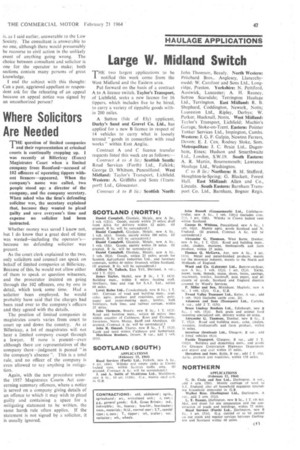Where Solicitors Are Needed
Page 49

If you've noticed an error in this article please click here to report it so we can fix it.
THE question of limited companies I and their representation at criminal courts is continually cropping up. 1 was recently at Billericay (Essex) Magistrates Court when a limited company from Romford—accused of 102 offences of operating tippers without licences—appeared. When the company's name was called, two people stood up: a director of the company, and the company secretary. When asked who the firm's defending solicitor was, the secretary explained that, because they wanted to plead guilty and save everyone's time and expense no solicitor had been instructed.
Whether money was saved I know not, but I do know that a great deal of time was wasted—including the operator's— because no defending solicitor was present.
As the court clerk explained to the two. only solicitors and counsel can speak on behalf of limited companies at Billericay. Because of this, he would not allow either of them to speak or question witnesses, and the prosecutor insisted on going through the 102 offences, one by one in detail, which took some time. Had a solicitor been employed, he would probably have said that the charges had been read over to the company's officers and they agreed with the details.
The position of limited companies in magistrates courts varies from court to court up and down the country. As at Billericay, a lot of magistrates will not hear a. limited company except through a lawyer. If none is present—even although there are representatives of the company there—judgment is passed "in the company's absence ". This is a total rule, and no officer of the company is even allowed to say anything in mitigation.
Again, with the new procedure under the 1957 Magistrates Courts Act concerning summary offences, where a notice is served on a company giving details of an offence to which it may wish to plead guilty and containing a space for a mitigating statement to be written, the same harsh rule often applies. If the statement is not signed by a solicitor, it is usually ignored.
























































































































